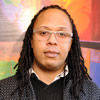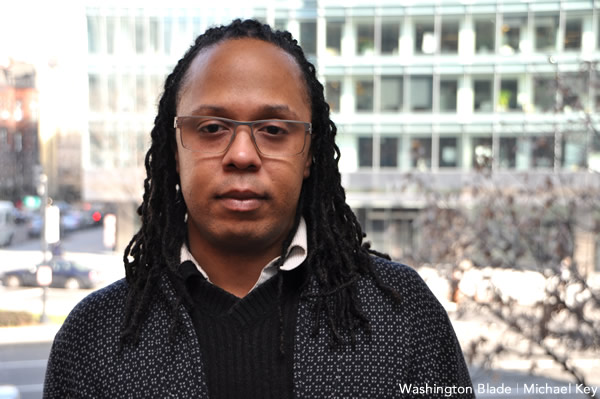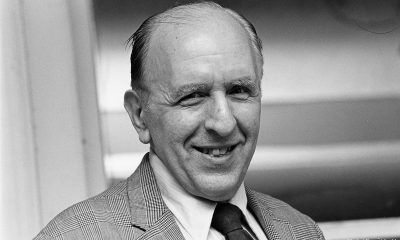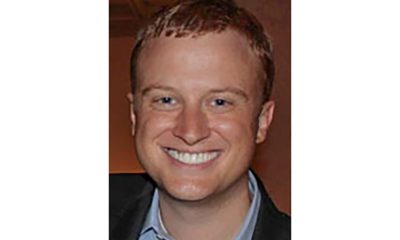Local
Housemate talks about Kameny’s home life
Gay activist’s ashes to be laid to rest in Saturday ceremony

Editor’s note: This is the second of a two-part report on Timothy Clark, the sole heir of Frank Kameny’s estate. Visit washingtonblade.com for more of this exclusive Blade interview.

Timothy Clark was Frank Kameny’s sole heir; the two lived together for almost 19 years in Kameny’s D.C. home, which is now on the market. (Washington Blade photo by Michael Key)
LGBT rights leaders from D.C. and across the country are scheduled to honor the late gay movement leader Franklin E. Kameny Saturday morning, March 3, at an interment ceremony in the city’s historic Congressional Cemetery.
Among those expected to attend is Timothy Lamont Clark, 35, Kameny’s friend, housemate, and heir of his estate. Clark’s 19-year friendship with Kameny was unknown to many of Kameny’s collaborators in politics and gay activism.
In an exclusive interview with the Washington Blade last week, Clark said he came to know a private side of Frank Kameny as the two developed a grandfather-grandson relationship that Clark says uplifted his own life and complimented Kameny’s tireless and rough-and-tumble role as a fighter for LGBT equality for more than 50 years.
Kameny died Oct. 11 at his home in Northwest Washington at the age of 86. Several years before his death friends and associates founded the Kameny Papers Project, which arranged for the papers documenting his life’s work as a recognized architect of the gay rights movement beginning in the early 1960s to be given to the Library of Congress, where they are available to researchers and scholars.
Gay historian David Carter, author of the nationally acclaimed book “Stonewall: The Riots that Sparked the Gay Revolution,” is writing Kameny’s biography.
Clark told the Blade he has long admired Kameny’s work on the local and national stage in the struggle for gay equality. But he said he shunned the whirlwind of political and movement events and activities that Kameny relished, calling himself “a very private person.”
Clark said he met the gay rights pioneer by phone at the age of 15 when he called the Gay Information hotline that Kameny operated out of his home in 1991.
At a time when he was struggling to accept his sexual orientation coming from a strong religious upbringing, Clark said Kameny gave him support and advice through a series of phone conversations that helped him cope with coming out to his family.
“If it would not have been for Frank maybe I would have been one of those kids committing suicide because I’m gay,” Clark said.
At Kameny’s invitation, Clark said he moved into the basement apartment of Kameny’s house in Northwest Washington in 1997 at the age of 20. Clark said he moved out in 1999 to live with his boyfriend in Virginia before returning to the house between 2002 and 2003, where he remained until Kameny’s death.
Following are excerpts of Clark’s Feb. 21 conversation with the Blade.
Washington Blade: Where were you living in D.C. before you moved in with Frank Kameny?
Timothy Clark: With my grandmother.
Blade: When you met him through the gay hotline he operated, did he help you come out as gay?
Clark: Yeah. When I first called him that’s what that was about. I saw that and he just guided me through that year.
Blade: Over the years that you knew Frank Kameny, did he visit any of your relatives and family members?
Clark: Yes, yes, yes. Frank went to Christmas dinners, Thanksgiving dinners, a cookout when my cousin Milton graduated from high school. Frank was a part of my family. Frank was like a grandfather to me. My grandfather passed away when I was little, but Frank was literally like a grandfather to me. We had our ups and downs, but that’s what families do. That’s what a family does. You go through things like that.
Blade: When you moved into his house, did he make it a rent or a roommate situation?
Clark: No, that’s what I want people to understand. It was a family thing. Even when I would offer things to Frank, Frank did not accept it. We just had a bond. I remember one time that I went to the Safeway. I was shopping and I got Frank – he always ate Stouffer’s for lunch and he always ate Healthy Choice for dinner. I bought Frank the groceries and I will tell you he literally went to the ATM and he was trying to give me the money back. I don’t know what it was about me but he was always like that. He never asked anything from me. I mean I was there for him. Of course, I made his breakfasts and his dinner. And I always cooked – we had – every other Sunday he would come down for dinner with me. I would cook a big dinner. Me, him and my friend Jessica, we would eat together.
Blade: You were like a family member?
Clark: That’s exactly what Frank and I were. It would always be to me as long as I’m here. It wasn’t a tenant. And well Frank even got – can I say it? [He looks at his lawyer, Glen Ackerman. Ackerman says to go ahead and say it.] In the last year or so in his life people were making accusations about me and saying things about me and saying that well, you should be charging him rent and who is this person? And then two cops came to the house and asked Frank was he being extorted. And Frank was really — Frank sat on that couch and said I have not worked all of my life for people in the community to treat him like that. I thought that was very disrespectful because the cops wanted to meet me. Actually, a guy from [D.C. Council member] David Catania’s office came over. He was a black guy my age. He came over and we talked. He didn’t even understand it but he said these things were going around and he wanted to talk to me to better understand that. But Frank was very, very upset by that. He felt as though that should not have taken place.
Blade: Did Frank make it clear to people that you were not a problem and he wanted you to be there?
Clark: Of course, of course.
Blade: Concerning the people who were raising concerns about you, some said they worried that Frank was supporting you financially with money he needed to meet his own household expenses.
Clark: How?
Blade: Some of his friends who didn’t know you said they wondered whether you were working and able to support yourself.
Clark: No, no, no, no. I will answer that. First, my work situation has nothing to do with anybody but me. Frank did not spend his money on Timothy. That’s one thing that I can tell you. When my grandmother passed, I was left money. You can call anyone in my family. I’ve always been well taken care of. I was in a relationship and still am sort of and have always been taken care of. And Frank knew everything about my relationship where everything was coming off.
And Frank did not take any money and spend it on me. I was living with Frank. I don’t have a passport to go out of town. I’m scared of flying. The only place I went was Myrtle Beach. I talked to Frank when I went there. Frank was not spending any money on me. Everything I got, I got through me — my computer, my bed, everything.
I can’t tell you where Frank’s money went. I do know — and he’s probably rolling in his grave — but I do know when I was into his family history and all that, but I know that Frank had money and things in stocks but when the stock market crashed a few years ago, that’s what he told me. As he always used to say, I’ve never been a financial whiz — things like that. I can’t tell you where his money went.
But I can tell you that it wasn’t to keep me because I do not sell myself to anybody. And that’s what that would have been if Frank was taking care of me. There was none of that going on. I have respect for myself. I may battle with my religion and being gay but one thing I would never do is sell myself to no man and no woman. I already have to answer for being gay but not that. I would never, ever use anybody that way because I would never want anyone to do that to me — never.
That’s the only thing that I get upset about. I would never sit back and use Frank, con Frank, do anything like that to him because I have respect for him because if it would not have been for Frank maybe I would have been one of those kids committing suicide because I’m gay. I would never have done that to him at all — at all.
Blade: Most people who knew Frank Kameny politically didn’t know you. Did you ever go to political events with him or was that always his thing?
Clark: His thing. I mean Frank always wanted me included, even one of the last events with the drag queens who gave him an award. He wanted me to go. I just — I’m not that kind of a person. I’m private. Now that he’s gone I feel bad that I never went to anything.
But it was things like when he had a birthday party this past year, his last birthday party, I think it was somewhere near Logan Circle somewhere and he wanted me to go. But I didn’t go. But when he came home like the next day I got a cheesecake from the Cheesecake Factory. I had two bottles of champagne and I made a little dinner and Frank came down with Jessica and me and celebrated.
Frank was like, he said this is what he was looking forward to. He loved my cooking. That’s why I never went to these things. Frank always said I wasn’t gay enough, that I didn’t care about the cause. He did, but that wasn’t my thing. Frank finally got me to go to the Gay Pride.
Blade: Do you mean the gay pride parade?
Clark: Yeah, the parade. That’s never been my thing. But he finally got me to go.
Blade: Do you think some of the rumors about you started because Frank Kameny was a famous person of sorts and just like other famous people, the public wants to know about the people who are part of their lives? He was known nationally as a preeminent leader for gay rights.
Clark: Right, and so was Whitney Houston.
Blade: That’s right, and everyone wants to know what her ex-husband is doing.
Clark: Yeah, her ex-husband. Frank and I were not lovers. Let’s get that straight… Let me just say something. I think what it is — when those people wanted to meet me — I do not talk about Timothy. I can give you my mother’s telephone number right now and you can ask her things about me. I do not talk about my personal business with anybody. And I think that’s what upset a lot of them.
Blade: Your lawyer has said you will be selling Frank Kameny’s house that you’ve inherited. What are your plans after that? Once the house is sold and this probate process is completed, are you planning on staying in this area? Have you made any decisions on that?
Clark: I’m going to Charlotte. I’m getting away. I’m moving away so I have time to really grieve and really have time to think about the memories I have of Frank. I have not been able to do that.
Blade: What are some of the things you remember of Frank Kameny?
Clark: I will never forget the last time I went to Myrtle Beach and Frank said what are you getting ready to do? Frank had called me because we always talked at 12 o’clock. I said, ‘Frank I’m paying my tab. I’m at the club.’ He said, ‘Timothy, you get back to your hotel. You don’t know those people down there — drinking and galloping around.’ I said, ‘Frank, I am 35 years old.’ I said, ‘Don’t you call me long distance telling me what to do.’ And that was one of my last fun memories of Frank.
Blade: Are you saying he obviously cared for you?
Clark: Yeah, and he fed my dog for me. He called me and said the dog has been fed. You see Frank and me we really got a kick out of each other. That’s what I can talk about. I got a kick out of Frank. I loved him to pieces.
Blade: Did you mention earlier that you did things together but they were non-political going back to when you first got to know him?
Clark: It was way back and I was still living with my grandmother. My aunt knew somebody at Ticketmaster and she got four tickets to see Patti LaBelle. I said Frank we’re going to see Patti LaBelle. He said I’ve heard of her, but Frank was into Mozart. I said Frank I want you to come. I was sitting here and Frank was sitting here and my aunt was sitting there. I took him to see his first Patti LaBelle concert. And it was so amazing.
So we went to see Patti LaBelle a couple of times. He and I went to Blue’s Alley in Georgetown. Me, him and Jessica, we went to see Eartha Kitt. And then after the show you could go upstairs and Eartha Kitt was there and she said to him, nice to meet you. And he said I’m Frank Kameny, gay activist. I said, ‘Frank not here. She’s not interested in that.’ We just laughed. So he got to shake Eartha Kitt’s hand. Frank and I did things together. The only thing he would not take part in was my gospel concerts. Other than that — he didn’t believe in that — but other than that, me and Frank did a lot of things together.
Me and Frank really shared things together. I know how Frank liked his food, his coffee — full sugar cubes; fill the coffee thing right up here and all the milk. I would make his food about 12 o’clock so about 1 o’clock it was near cold — but we shared things together.
Now, like I told you, we talked about political things, too, like about Obama, how he felt about living to see Obama be president, even though I wasn’t an Obama supporter — I was for Hillary — and things like that. That was us. We would argue about things, about the marriage thing. I said you know Frank sometimes gays want too much. I said we’re getting that much but let’s just let Obama get in and do things. And he argued me down about it but that was us. We shared.
Frank would come down in the basement because I wouldn’t come upstairs — it was a mess he wouldn’t allow me to clean up. I cleaned up and he would get mad. He said it was a mess but it was his mess and he knew where things are. But he would come downstairs and we would watch TV.
Blade: Glen Ackerman, your lawyer, mentioned that you recently moved out of the house after Frank’s death. Was there some kind of problem?
Clark: I had never witnessed anything like that day when Frank passed away. It just scares the living crap out of me. And it’s like just to be there — even though the memories are good, there’s nothing bad, but it’s the fact that I found him like that. It just breaks my heart. I don’t know. It doesn’t sit right with me. It doesn’t feel like home anymore. You know what I mean? There’s no peace any more.
Blade: Your lawyer said you were also troubled over a letter that someone hand-delivered to the house. Was it an anonymous letter?
Clark: Yeah. It was pushed through the thing [mail slot on front door]. It was just right there. And that’s just horrible for anybody to say, no matter what your opinion is, to say that. It said, ‘The nigger got everything.’
Blade: Did it have your name on it?
Clark: No, but whoever it was must have known that situation what’s going on.
Maryland
Montgomery County police chief discusses arrest of trans student charged with planned school shooting
County executive tells news conference student’s trans identity is irrelevant to criminal charge

Montgomery County, Md., Police Chief Marcus Jones joined other county and law enforcement officials at a news conference on Friday, April 19, to provide details of the police investigation and arrest of an 18-year-old high school student charged two days earlier with threats of mass violence based on information that he allegedly planed a mass shooting at the high school and elementary school he attended in Rockville, Md.
In charging documents and in a press released issued on April 18, Montgomery County Police identified the arrested student as “Andrea Ye, of Rockville, whose preferred name is Alex Ye.”
One of the charging documents states that a friend of Ye, who police say came forward as a witness who played a crucial role in alerting authorities to Ye’s threats of a school shooting, noted that Ye told the witness that Ye identified as the transgender student he wrote about as a character in a 129-page manifesto outlining plans for a school shooting. Police have said Ye told them the manifesto was a fictional story he planned to publish.
At the news conference on Friday, Police Chief Jones and other law enforcement officials, including an FBI official and Montgomery County Executive Marc Elrich, referred to the student as Alex Ye and Mr. Ye. None of the officials raised the issue of whether Ye identified as a transgender man, seven though one of the police documents identifies Ye as a “biological female.”
County Executive Elrich appeared to express the views of the public officials at the news conference when one of the media reporters, during a question-and-answer period, asked Elrich why he and the others who spoke at the news conferment failed to “admit that this individual was transgender.”
“Because it’s not a lead,” Elrich replied, asking if the press and law enforcement authorities should disclose that someone arrested for murder is “a white Christian male who’s heterosexual.” Elrich stated, “No, you don’t – You never publish somebody’s sexual orientation when we talk about this. Why you are focusing on this being a transgender is beyond me. It’s not a news story. It is not a crime to be transgender.”
The reporter attempted to respond but was cut off by the press conference moderator, who called on someone else to ask the next question.
In his remarks at the press conference Chief Jones praised the so far unidentified witness who was the first to alert authorities about Ye’s manifesto appearing to make threats of a mass school shooting.
“Now, this is a situation that highlights the critical importance of vigilance and community involvement in preventing potential tragedies,” Jones said. “I commend the collaborative efforts of the Montgomery County Police Department, the Federal Bureau of Investigation, the Rockville City Police Department, and the Montgomery County Public Schools, as well as Montgomery County Health and Human Services,” he told the gathering.
“Thanks to their swift action and cooperation a potentially catastrophic event was prevented,” Jones said.
Jones pointed out that during the current school year, police have received reports of 140 threats to the public schools in Montgomery County. He said after a thorough investigation, none of them rose to the level where an arrest was made. Instead, police and school officials took steps to arrange for the student making the threats and their parents to take remedial action, including providing mental health services.
“But this case is different,” Jones said. “This case is entirely different that takes it to a different level. It was a concerned witness who brought this matter to light by rereporting the suspect’s manifesto to the authorities. This underscores the value of community engagement and the ‘see something say something’ approach,” he said.
Jones mentioned at the press conference that Ye was being held without bond since the time of his arrest but was scheduled to appear in court for a bond hearing on Friday shortly after the press conference took place to determine whether he should be released while awaiting trial or continue to be held.
In his manifesto obtained by police, Ye writes about committing a school shooting, and strategizes how to carry out the act. Ye also contemplates targeting an elementary school and says that he wants to be famous.
In charging documents reported on by WJLA 7 and WBAL 11, the 129-page document, which Ye has referred to as a book of fiction, included writings that said, in part:
“I want to shoot up a school. I’ve been preparing for months. The gun is an AR-15. This gun is going to change lives tomorrow … As I walk through the hallways, I cherry pick the classrooms that are the easiest targets. I need to figure out how to sneak the gun in. I have contemplated making bombs. The instructions to make them are surprisingly available online. I have also considered shooting up my former elementary school because little kids make easier targets. High school’s the best target; I’m the most familiar with the layout. I pace around my room like an evil mastermind. I’ve put so much effort into this. My ultimate goal would be to set the world record for the most amount of kills in a shooting. If I have time, I’ll try to decapitate my victims with a knife to turn the injuries into deaths.”
Maryland
Rockville teen charged with plotting school shooting after FBI finds ‘manifesto’
Alex Ye charged with threats of mass violence

BY BRETT BARROUQUERE | A Montgomery County high school student is charged with what police describe as plans to commit a school shooting.
Andrea Ye, 18, of Rockville, whose preferred name is Alex Ye, is charged with threats of mass violence. Montgomery County Police and the FBI arrested Ye Wednesday.
The rest of this article can be found on the Baltimore Banner’s website.
District of Columbia
New D.C. LGBTQ+ bar Crush set to open April 19
An ‘all-inclusive entertainment haven,’ with dance floor, roof deck

D.C.’s newest LGBTQ+ bar called Crush is scheduled to open for business at 4 p.m. on Friday, April 19, in a spacious, two-story building with a dance floor and roof deck at 2007 14th St., N.W. in one of the city’s bustling nightlife areas.
A statement released by co-owners Stephen Rutgers and Mark Rutstein earlier this year says the new bar will provide an atmosphere that blends “nostalgia with contemporary nightlife” in a building that was home to a popular music store and radio supply shop.
Rutgers said the opening comes one day after Crush received final approval of its liquor license that was transferred from the Owl Room, a bar that operated in the same building before closing Dec. 31 of last year. The official opening also comes three days after Crush hosted a pre-opening reception for family, friends, and community members on Tuesday, April 16.
Among those attending, Rutgers said, were officials with several prominent local LGBTQ organizations, including officials with the DC Center for the LGBTQ Community, which is located across the street from Crush in the city’s Reeves Center municipal building. Also attending were Japer Bowles, director of the Mayor’s Office of LGBTQ Affairs, and Salah Czapary, director of the Mayor’s Office of Nightlife and Culture.
Rutgers said Crush plans to hold a grand opening event in a few weeks after he, Rutstein and the bar’s employees become settled into their newly opened operations.
“Step into a venue where inclusivity isn’t just a promise but a vibrant reality,” a statement posted on the Crush website says. “Imagine an all-inclusive entertainment haven where diversity isn’t just celebrated, it’s embraced as the very heartbeat of our venue,” the statement says. “Welcome to a place where love knows no bounds, and the only color or preference that matters is the vibrant tapestry of humanity itself. Welcome to Crush.”
The website says Crush will be open Tuesdays and Wednesdays from 4 p.m. to 12 a.m., Thursdays from 4 p.m. to 2 a.m., Fridays from 4 p.m. to 3 a.m., Saturdays from 2 p.m. to 3 a.m., and Sundays from 2 p.m. to 12 a.m. It will be closed on Mondays.
Crush is located less than two blocks from the U Street Metro station.
-

 Africa5 days ago
Africa5 days agoCongolese lawmaker introduces anti-homosexuality bill
-

 District of Columbia1 day ago
District of Columbia1 day agoReenactment of first gay rights picket at White House draws interest of tourists
-

 World5 days ago
World5 days agoOut in the World: LGBTQ news from Europe and Asia
-

 Arizona2 days ago
Arizona2 days agoAriz. governor vetoes anti-transgender, Ten Commandments bill












